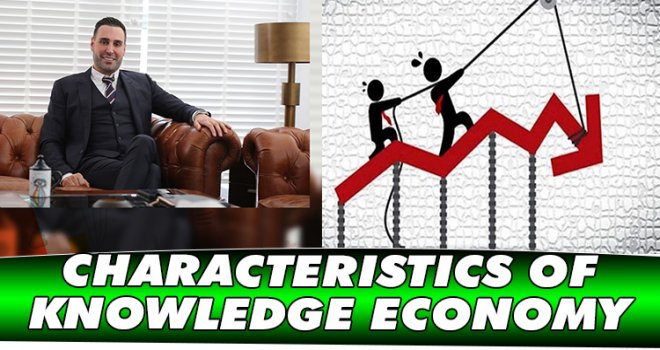

CHARACTERISTICS OF KNOWLEDGE ECONOMY

The place that contemporary economic analysis gives to the concept of "belief" is paradoxical. The latest developments in various fields such as sunspot equilibrium theory, decision theory, game theory, information asymmetries theory and even cognitive economics confirm the growing role assigned.
However, the concept of faith remains a stowaway. While most economists today acknowledge that it is ubiquitous, they do not give it the central place it deserves.

The reasons for this situation are undoubtedly complex. But we can only regret the absence of a general and systematic consideration of the role of beliefs in the economy.
The generalization of the use of the notion of belief is actually the result, not of chance, but of three main concerns of contemporary theory. It all has to do with our representation of the concept of economic agent.
On the one hand, game equilibria need to be gradually replaced by equilibria in the new microeconomics. It has significantly changed the way economists coordinate between agents and the way they arrive at a constant. Thus, the concept of strategic equilibrium has led economists to question the conditions under which it is possible to base such a balance on the existence of knowledge and beliefs.
It is clear that this question has no real significance within a classical framework. On the other hand, we know the problems it poses within the framework of game theory.
In the early 1930s, this difficulty was identified. In any interaction system, agents base their decisions on predictions they can make about their assumed behavior. But these decisions and forecasts must be rational.
This raises the usual self-reference problem: Microeconomic behavior needs to be proven to be rational. He also needs to have some knowledge of the knowledge and beliefs of the individual and other economic actors.

But of course, some of this knowledge and these beliefs depend on the knowledge and beliefs of the same individual. At the same time, especially balancing processes, the two terms of the "educational"/"evolutionary" pair are contrasted.
It would be helpful to use the way in which these two main types of mechanisms are characterized. The ultimate balance can be reached through careful reasoning by the players.
In other words, it looks at how the economy relates to its own decisions and to expectations of other actors' decisions. It is assumed that they can develop very detailed representations of social interaction processes and global outcomes.
Types of mental negotiation, and hence their beliefs, reflect an extremely strong rationality: common knowledge hypotheses about the structure of a game and contributes to the rationality of all participants in that game.
Thus, reaching equilibrium is possible through the only combination of the agents' hyper-rational beliefs.
The evolutionary scheme, on the contrary, is characterized as a dynamic process in which equilibrium is achieved through evolutionary mechanisms.
These mechanisms can take a wide variety of forms. We can also talk about natural selection mechanisms that are close to the modern evolutionary approach or self-reinforcing processes.
What all these evolutionary diagrams have in common is their common knowledge of the structure of the economy and the rationality of the economy. That is, they do not have a strong form of rationality that allows them to access it through simple mental deliberation.
Therefore, they rely solely on knowledge of the past, the individual experiences associated with it, and the forms of social interaction they observe. At the same time, they make decisions based on beliefs. Thus, they indirectly contribute to the establishment of interindividual evolutionary mechanisms that they ignore.
Actors can resort to learning schemes, which can be very variable in content, but play a very important role in the processes of reaching equilibrium.
Dr.Yaşam Ayavefe
-
 Arıklı, 23 Nisan Ulusal Egemenlik ve Çocuk Bayramı dolayısıyla mesaj yayımladı..
Arıklı, 23 Nisan Ulusal Egemenlik ve Çocuk Bayramı dolayısıyla mesaj yayımladı..
-
 Tosunoğlu: Vekil olmaktan mutlu değilim
Tosunoğlu: Vekil olmaktan mutlu değilim
-
 Dünyada israf edilen gıdalar, yetersiz beslenen insanların 2 katından fazlasına ..
Dünyada israf edilen gıdalar, yetersiz beslenen insanların 2 katından fazlasına ..
-
 Oğuz: 3 ayda bin 462 kişiyi ülkeye almadık, 827 kişiyi deport ettik
Oğuz: 3 ayda bin 462 kişiyi ülkeye almadık, 827 kişiyi deport ettik
-
 YÖDAK’ın Araştırılması Komitesi Başkanı Hasan Küçük oldu
YÖDAK’ın Araştırılması Komitesi Başkanı Hasan Küçük oldu
-
 Stefanu’dan Hristodulidis’e sert eleştiri: Kıbrıs sorununda izlediği çizgi esasl..
Stefanu’dan Hristodulidis’e sert eleştiri: Kıbrıs sorununda izlediği çizgi esasl..
-
 BAHÇELİ’DE YOL YENİLEME ÇALIŞMALARI BAŞLADI
BAHÇELİ’DE YOL YENİLEME ÇALIŞMALARI BAŞLADI












